I originally wrote this article in 2014, but updated it in 2017 to reflect the more modern third party search solutions available for Magento 1 and 2.
Search is a hugely important feature for any eCommerce store, regardless of size, industry or nature – speeding up and simplifying the process for consumers to find products that they’re looking for. Often, depending on the complexity and size of the product catalog, different types of stores will require a different search journey and experience to allow for an easier and faster experience for users to find their desired items. Examples of features that could be required as part of this could be faceted search, searching by SKU or item number, a different experience for different customer groups, full page search, an instant search experience and various others. The below options cover all of the core premium search solutions available for Magento.

Search is frequently overlooked as a ‘nice-to-have’ by merchants, which may be justifiable for some smaller stores, but most come to this conclusion without understanding the role it plays within their user journeys and the impact it can have on a store’s conversion rate. I recently went through the Google Analytics accounts of 15 stores and the average uplift in conversion for users who completed a search was 250%. These stores varied in terms of the industry and the types of products being sold, but I’d generally expect somewhere around 200% to 300% higher conversion rates.
Magento’s default search solutions are known for being poor out of the box, in terms of general flexibility and the query matching accuracy. Magento 1 Enterprise uses Solr, which is an indexing technology that has the power to provide accurate results, but only if deployed in an effective way. Unfortunately, this isn’t the case with the Magento Enterprise implementation and it’s a very common area for merchants to question. Magento 2 Enterprise Edition uses elasticsearch instead, but it’s a similar situation with the out of the box setup not supporting longer tail queries and only really allowing for queries directly related to a product name. Lots of the premium solutions are built on top of Solr or Elasticsearch, they just add a lot more layers of data and use things like machine learning or natural language processing to aid the matching of more complex queries.
Depending on the nature of your products and the level of trade you do, you will have different requirements for a third party, premium site search solution – which is why I’ve created this resource outlining the key benefits and features of each solution.
The solutions below are generally quite similar, but the differentiators will generally come from things like B2B features, catalog enrichment, natural language processing etc. I’ve done my best to outline these clearly, but feel free to drop me an email if you want any advice around the different solutions ([email protected]).
Klevu
DISCLOSURE: I started consulting for Klevu in 2016, but I had already used their technology with clients and passed them new merchants, so my initial review was unbiased. I’ve tried to keep the review honest and based on my experience with using the solution.
Klevu has a well-known, highly regarded integration with Magento (they’re also a technology partner) that was initially architected by Meanbee (Magento 1.x module). I’ve been using Klevu with clients since mid-2015 and have always been impressed with the accuracy, particularly with more complex queries. One of the main selling points of Klevu is its machine learning capabilities – which help to provide an additional layer of merchandising based on how users are interacting with results. Klevu starts from $19 for smaller merchants, but I’d generally be more likely to recommend it more to mid-level and enterprise-level Magento stores. The reason for this is that the key features of Klevu come from it’s merchandising solution, the automated catalog enrichment available in the premium and enterprise packages and the natural language processing offering (which helps Klevu to understand more about complex queries and context).
Other features include faceted search, advanced reporting rule-based merchandising, advanced synonym management and various other front-end options. Klevu’s premium version starts from $499, which has yielded the best results for clients I’ve worked with (mostly because that’s where you get the catalog enrichment).
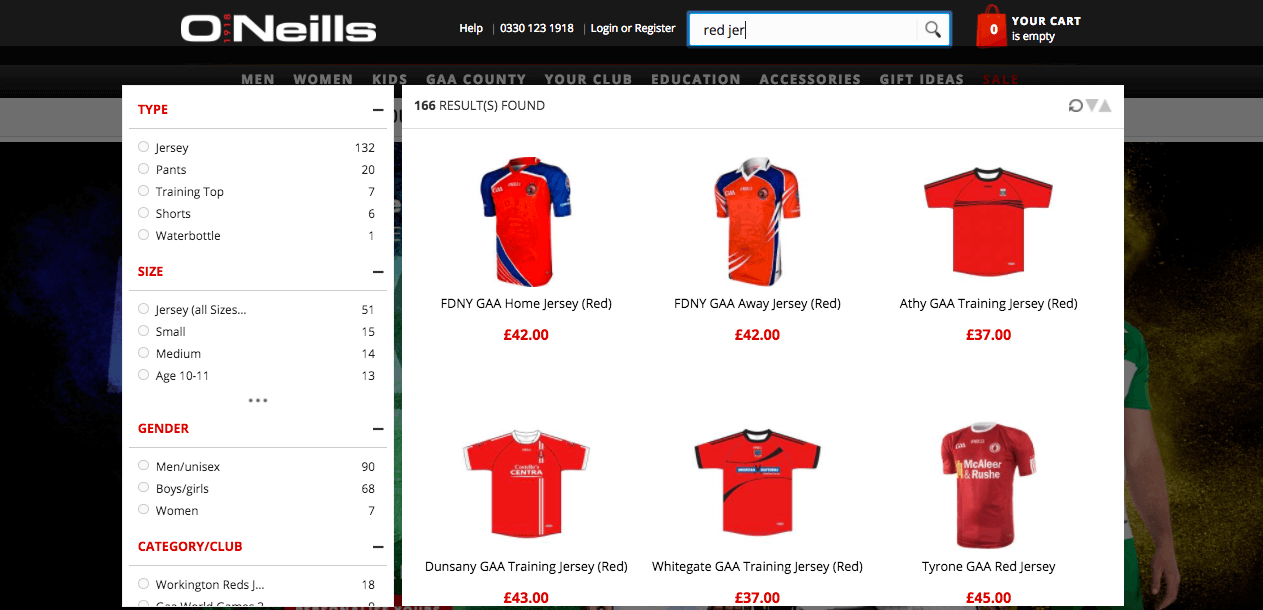
Klevu is also a cloud-based search solution (allows for a faster experience) that is easy to integrate with Magento 1 and 2 stores (Klevu has plug n play modules for M1 and M2). Examples of large Magento merchants using Klevu include Agent Provocateur, Odlo, Osprey London, O’Neills, Yamaha, Clintons, Helly Hansen, Bauhaus, Gant and many more.
I’d always recommend Klevu to merchants, but I do know a lot more about the product than some of the competitor solutions. Klevu is also known for being good value at the premium level.
Algolia
Algolia is another very strong search solution, that tends to excel around the speed in which they serve results. Algolia’s implementation on Jado Pado (non Magento) is a great example of both exceptional speed and great UX, I’d recommend looking at this implementation. Algolia have existing extensions for Magento 1 and Magento 2 and they’re also a technology partner.
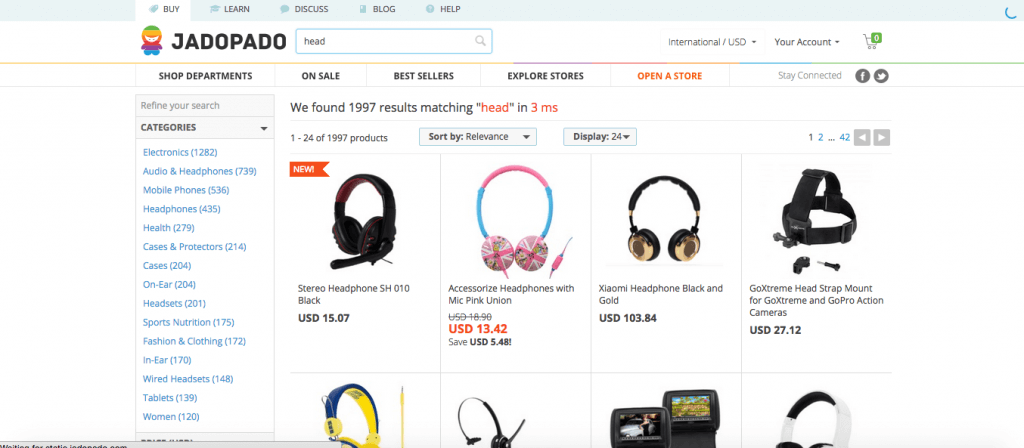
Algolia is very intuitive and user-friendly and the actual indexing technology is their own (they’re essentially competing with Solr and Elasticsearch, as well as the eCommerce solutions). Algolia’s main selling point is their real-time search – while users are entering their search query, Algolia updates and shows results in real time, providing super fast results (as per the Jado Pado example). This can be applied in the background or in a fly-out layout.
Although Algolia is a really nice solution and it’s great from a UI / UX solution, one advantage for some of the other solutions (such as Celebros or Klevu) is around the use of natural language processing to cater for more complex queries.
Examples of Magento merchants using Algolia include GolfDiscount, Beyond Retro and Lancaster. Again, Algolia is known for being a good value option in the enterprise-bracket, often competing with SLI and Klevu in this space.
Celebros
Celebros is another highly regarded third party search solution who have a Magento 1 and 2 integration. Celebros have a similar solution to Klevu, but as far as I know / have seen have considerably less market share. From what I’ve seen of Celebros it’s a good solution and they also have merchandising solutions, similarly to SLI and Klevu.
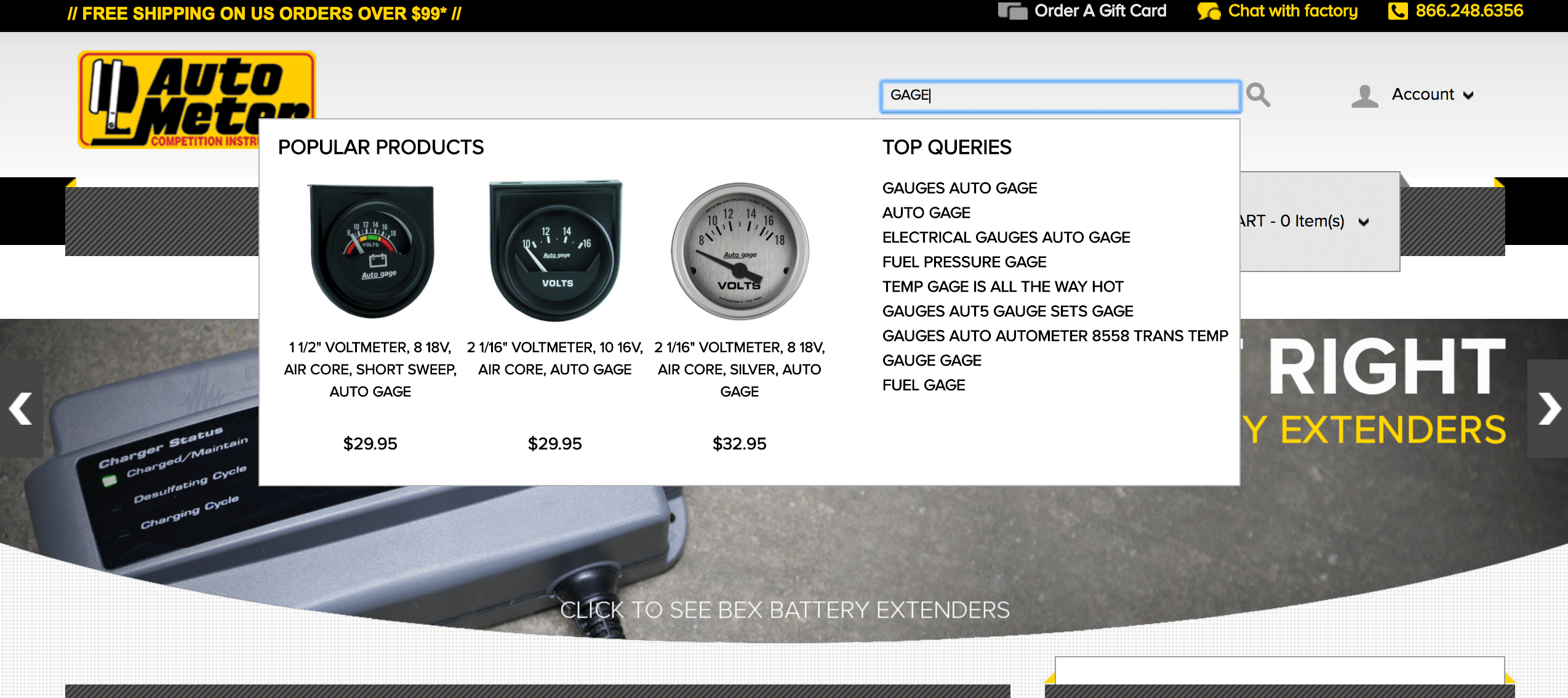
Celebros is definitely in the premium bracket from a pricing perspective and would likely come in higher than Klevu and Algolia. I don’t believe that their out of the box feature-set is as strong as some of the other key players in the Magento space, but they do have a very tight relationship with Magento, so I’d imagine they’re still a good solution.
Examples of Celebros clients include Autometer, Roadrunner and Hirmer.
SLI
SLI is the longest-standing premium eCommerce search solution and they have a lot of well-known Magento merchants on their books. SLI power a huge amount of mid-level and enterprise-level stores and have a high market share in the fashion space.
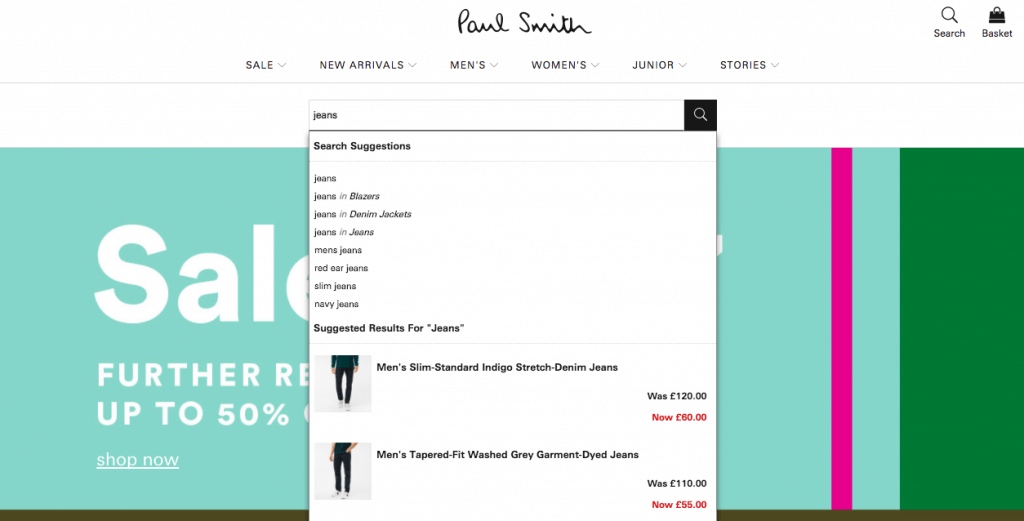
Over the last couple of years, Klevu and Algolia have grown significantly, which will have impacted SLI’s market share considerably, as they offer a host of disruptive modern features around speed and accuracy. That said, I’d imagine SLI are still the market-leader, purely because of the client base they have had for a number of years, which includes the likes of NEXT, Paul Smith and Closer London.
From what I’ve heard from clients, the biggest issue with SLI Systems is around the integration – which isn’t as simple as plug-and-play with Magento like it is with Celebros, Klevu and Algolia – adding a much bigger overhead around development and also for the internal team managing the implementation. That said, it’s supposed to very flexible around query merchandising.
Nextopia
Nextopia is a great option for smaller Magento merchants and they have some really nice features at the entry-level end of the market. That said there are larger Magento merchants that use Nextopia, but they’re more commonly associated with the SME and mid-level end of the Magento space.
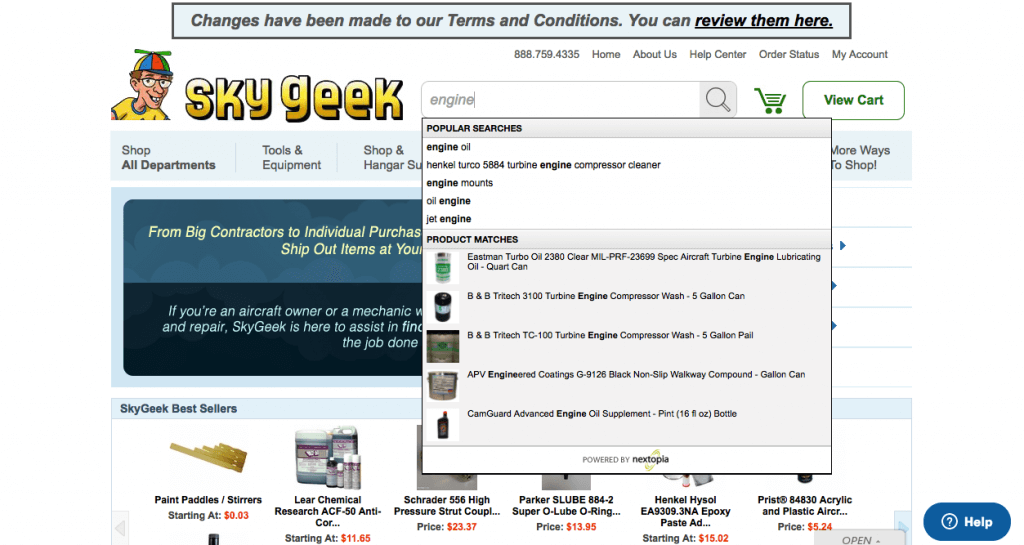
Nextopia have got a good market share in the US, mostly in the SME bracket – examples of Nextopia customers include OKA, Tackle Direct and SneakerHead.
Loop54
Loop54 are a lesser-known search solution that pitch themselves at the enterprise-level of the market. I’ve never worked with a merchant who have used Loop54, but they do have some good brands within the Magento space. Examples of Loop54 clients include XXL and Office Depot.
Conclusion
There are lots of search extensions available for Magento, these are just some of the ones that I’ve used and some that have been recommended to me. In addition to these options, there are more enterprise-level options available as well, such as Attraqt, FactFinder and SLI systems – all of which offer more than just site search.
I think all of the above provide big improvements on the existing Magento search, however it does definitely come down to individual requirements – for example I really like Klevu because of it’s NLP capabilities and it’s ability to provide more accurate results for more long-term queries.
If you think that there are extensions or solutions that I’ve missed, feel free to reference them in the comments below.
9 Responses
Great article, many thanks.
FACTFINDER from Omikron is a solution we like and use a lot. SaaS or on premise, including search campaigns, can cope with typos, superfast.
Hi Paul – any experience with Google? – looking at that on a site now and I’ve used a lot of site searches before, but excluding that one …
Very good review of searches Paul.
I am in process of reviewing site searches for Magento, plan to review around 10, did a bit over half of the job. You can check my reviews at http://magenable.com.au/tag/site-search/
Also had a look into Algolia and Sphinx Search Ultimate (same with you). So far these 2 looks like the best value for money for me.
Regards
Alex
Thanks Alex – you should look at Klevu as well!
Excellent Post. Thanks for share. Very important factor described above about searching in e-commerce site. I also used google custom search magento extension in my site. It works great and also helpful to get more online business. It may be helpful for someone check out here: http://bit.ly/1QaRYPc
Thanks for sharing…
I want to recommend one another powerful Google custom search integration extension for Magento 2 to enhance search functionality of store. Check out for more features: goo.gl/6reOUh
I often install Search autocomplete and suggest extension for magento by Plumrocket. It’s a fast and useful tool which is brilliant compared with magento native search!
Hi Paul,
Great article & good selection. It would be interesting to add Doofinder (http://www.doofinder.com, specialized in eCommerce search, a SaaS internal search solution with more than 3 K customers, with voice search and with many marketing functionalities. I invite you to try it 🙂
expertrec has a good search extension for magento as well. price at 9 USD per month. https://www.expertrec.com/magento-search/ https://uploads.disquscdn.com/images/63bc7d203e8d8ad6a14e0c87c9cefce3ce4b0a0ecb6ca1ef1c6c12407ae8cb8a.png